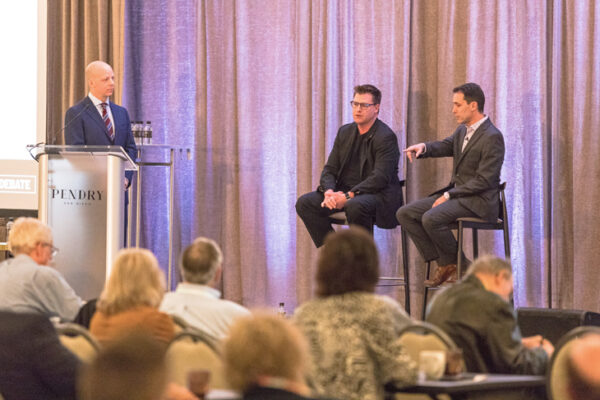A Young Audience… an Angry Old Man… and a Sad Outcome
- On Monday, Alex discussed a recent debate of socialism versus capitalism that he attended.
- Today, he’s taking a deeper look at some of the socialist arguments and why they’re not valid in today’s market.
In my last column, I reported on a debate I attended in New York City last week where two capitalists squared off against two socialists, including author and academic Richard D. Wolff, a committed Marxist.
It was an Oxford-style debate. And the socialists won.
That surprised me.
Partly because socialism has been an abject failure everywhere it’s been tried – ask any Cuban or Venezuelan – but also because Wolff made a slew of deeply confused arguments.
For starters, he doesn’t appreciate the difference between national governance and corporate governance.
We live in a democracy, yes. Yet he’s angry that business enterprises are “undemocratic.”
He told the audience at the outset…
I’m the professor, so I’m going to begin with a little lesson…
In every enterprise there is a king. The owner, the director, the board of directors, a tiny group of people who make the decisions about what to produce, how to produce, where to produce, and what to do with the profits, the profits everybody helped to produce.
He thinks corporations must be restructured so that the employees run the business – not the owners (shareholders) or the professionals they hire to manage it.
Wolff has no respect for basic property rights, the foundation of capitalism.
Think about this…
Let’s say you own a house and hire a team of workers to paint it.
You’d be surprised if they painted it a color other than the one you chose, decided to apply just one coat instead of the two you requested or inexplicably left the chimney unpainted.
You wouldn’t allow them to make decisions like these because – after all – it’s your home.
Of course, even a socialist might concede that those are temporary workers, not full-time employees.
But does that really change much?
Imagine that you own the same home but employ a full-time housekeeper, gardener and nanny.
Do these workers get to make the important decisions about how you run your home?
Of course not, just as they wouldn’t allow such a thing in their own homes.
Wolff insists that workers today are nothing more than “serfs and slaves.”
Baloney. Employers – or at least the ones who stay in business – know they have to compete for capable employees.
And employees are aware that if they don’t like the pay, the benefits, the hours, the challenge or the opportunities for advancement – whether it’s a business or a nonprofit – they can take their talents elsewhere.
Where is the serfdom or slavery here?
Shareholders are like homeowners. The only real difference is that the property is a business instead of a residence.
Yes, employees should feel appreciated. They should feel like they are part of a team.
But they shouldn’t imagine they own the team.
Wolff argued that the profits of a company should be shared with the employees.
I agree, up to a point, as do most business owners.
Successful companies routinely offer raises, bonuses, promotions, 401(k) matching and/or option compensation.
But capitalism is a profit-and-loss system. If employees are entitled to the profits, they must also be responsible for any losses.
(Because – let’s face it – who would voluntarily take on a business partner who shares in the gains without taking any of the risks?)
Most employees don’t want to share in the losses, of course. And for good reason.
Most companies fail eventually. Nearly 80% of new ones do in the first five years.
Aside from property rights – and the issue of “fairness” in our profit-and-loss system – there is a matter of efficiency.
Few effective organizations operate in a democratic fashion.
Imagine a general ordering his men to take a hill, only to have his subordinate say, “Yeah, well I polled the men and they’re against that. We’re not doing it.”
I wouldn’t bet on that army defeating the enemy. Or on a worker-operated business beating the competition.
Yet these weren’t Wolff’s worst ideas.
That evening he went on to blame capitalism for everything from American slavery to World Wars I and II.
And, as I’ll show in my next column, he was only just warming up…
[adzerk-get-ad zone="245143" size="4"]About Alexander Green
Alexander Green is the Chief Investment Strategist of The Oxford Club, the world’s largest financial fellowship. For 16 years, Alex worked as an investment advisor, research analyst and portfolio manager on Wall Street. After developing his extensive knowledge and achieving financial independence, he retired at the age of 43.
Since then, he has been living “the second half of his life.” He runs The Oxford Communiqué, one of the most highly regarded publications in the industry. He also operates three fast-paced trading services: The Momentum Alert, The Insider Alert and Oxford Microcap Trader. In addition, he writes for Liberty Through Wealth, a free daily e-letter focused on financial freedom.
Alex is also the author of four New York Times bestselling books: The Gone Fishin’ Portfolio: Get Wise, Get Wealthy… and Get On With Your Life; The Secret of Shelter Island: Money and What Matters; Beyond Wealth: The Road Map to a Rich Life; and An Embarrassment of Riches: Tapping Into the World’s Greatest Legacy of Wealth.






